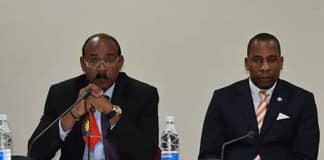
“We have to keep plastic in use for as long as possible. Why lose all that value to the landfill, or even worse the environment, when we can make something smart?” says Willemijn Peeters of Searious Business.
Not all plastic can be eliminated or reused. There will always be some plastic that will end up as trash, especially in remote areas where the waste management is under-developed. In an ideal world, we would recycle our plastic waste back into the same products in an infinite loop, but that is not the reality for most types of plastic. That is where waste-to-product solutions can breathe new life into discarded plastic trash.
What do we do with all this plastic waste?
The International Union for Conservation of Nature (IUCN) began the Plastic Waste Free Islands project, as part of its “Close the Plastic Tap” programme, supported by the Norwegian Agency for Development Cooperation (NORAD) to solve plastic pollution on six islands from the Caribbean and Pacific regions. Since 2019, the IUCN, the government of Antigua and Barbuda, Asia Pacific Waste Consultants (APWC) and Searious Business have been analysing sector-specific plastic volumes on the islands. Together with local working groups from across the value chain, they have designed alternative resource recovery solutions to prevent waste from leaking into the environment. Supporting local economic and social development at the same time. The emphasis has been mainly on reduction by implementing reusable systems and eliminating unnecessary single-use products. They are also pushing circular principles through bottle-to-bottle recycling in the FMCG sector and net-to-net recycling in the fishing industry.
Waste not, want not
However, post-consumer waste is often mixed, contaminated and not suitable for food-grade recycling. Turning this useless waste into useful products can extend its life and keep it from going straight to landfill. A range of prototypes has been designed specifically for each island’s needs. The tourist sector is catered for, converting HDPE into patio furniture using low-key technology. Park benches made from contaminated HDPE and PP could be used in public spaces. A solution was found for dirty mixed waste, otherwise destined for landfill or uncontrolled burning in households. This contaminated waste can be press moulded into building materials and tiles ready for use in public construction.
Design and functionality
One of the waste-to-product prototypes designed by Searious Business is a chair made from recycled HDPE (HDPE). The chair has been shortlisted for the Plastics Recycling Awards Europe 2021 and shows that you don’t need to sacrifice aesthetics in the name of sustainability. High-Density Polyethylene (HDPE, also known as #2 plastic) is used in countless everyday products such as shopping bags, pipes, crates, and detergent and milk bottles. Recycling in remote island locations can be a challenge, so designing solutions using low-key technology was imperative. The chair is made using traditional mechanical recycling and extrusion techniques to produce planks with a ‘wood’ effect. It is modular in design so that if one part gets damaged, it can easily be replaced without scrapping the whole chair. It can be used within the tourism industry and provide pleasure to people visiting the islands in the future.
Race against Waste
Prototypes have been designed and produced, collection and recycling partners have been identified, and numbers have been crunched to develop a realistic product portfolio. Representing a positive business case targeting different markets, highlighting the financial and environmental benefits. Launching customers on the islands are starting to show interest, even before formal market introduction. The ‘Race against Waste’ campaign has begun where the islands can ‘race’ against each other to turn these designs into reality. Who will be the first to produce and actually use products made from their island’s waste? An exhibition of the prototypes will be held soon so local furniture makers can view the products and see if they could bring them to life.
“We would like local manufacturers to step forward and start producing these products.” says Willemijn, “The value of this plastic should stay in the local economy and benefit the community as a whole”.
If you are interested or know anyone who can help, contact us.

#plasticwastefreeislands #closetheplastictap #wastetoproduct #recycling #furniture
Advertise with the mоѕt vіѕіtеd nеwѕ ѕіtе іn Antigua!
We offer fully customizable and flexible digital marketing packages.
Contact us at [email protected]















